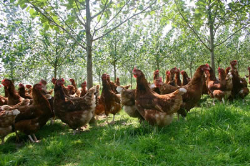
Sainsbury's has revealed ambitious plans to source all its free range and organic eggs from hens that have access to woodland.
Following the success of its Woodland brand, developed in conjunction with its major supplier Deans Foods, the retailer is switching all its own-label organic eggs over to Woodland by the end of this year and says all its free range eggs will be Woodland by the end of 2007.
Woodland free range was first introduced in 2003 and was the brainchild of BFREPA vice-chairman John Widdowson who, keen to see his birds spend more time outside, covered large areas of the range with overhead shade in the form of poplar trees. Launched in selected stores—initially with just two lines—the sales and the range soon grew.
In September 2004 Woodland Organic was launched and replaced Soil Association certified eggs on the shelves of Sainsbury's stores. The brand presently sells alongside the retailer's own label organic eggs but now Deans' contracted organic producers and the company's own farms are busy planting trees to meet the anticipated weekly demand of around 2250 cases (Source: TNS) once the switch to Woodland Organic is complete.
Sainsbury's says it is responding not only to customer demand but also to the proven welfare benefits associated with providing overhead shade to ranging hens.
Egg buyer Rob Farr said: "Studies show that the birds remain much calmer when they use the tree and bush planted range and are able to express natural behaviours.
"Our customers are particularly interested in supporting free range egg farms and this project will also mean that they can now help towards planting more trees and encouraging potential biodiversity in the UK."
Deans is funding the cost of tree planting on its supplying organic farms as well as paying a 1p a dozen premium. The company's agricultural director Andrew Jorêt told the Ranger that a detailed spec had been drawn up for the scheme that required trees planting on a minimum of 20 per cent of the total range area.
"We are not specifying the types of tree but suggest a 50/50 mix of slower growing native species along with species such as poplar, willow and aspen which have the potential for rapid growth and will quickly provide cover," said Mr Jorêt.
And for some producers the specifications demand tighter organic standards than they may already be working to.
"We've also opted for the 3000 bird maximum flock size and six birds a square metre stocking rate which currently only applies to organic units that came into production after 1999," explained Mr Jorêt.
This has led to Deans converting some of its own units and buildings which previously housed 6800 birds have been extended and split down the middle to now accommodate two 3000 bird flocks.
To satisfy Sainsbury's that the scheme will be independently verified, Deans has arranged for organic certification bodies OF&G and OF&F to carry out a 'woodland audit' during the normal organic inspection.
